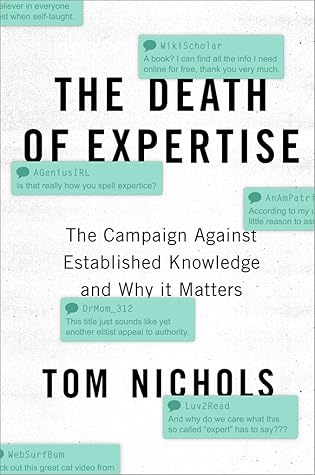More on this book
Community
Kindle Notes & Highlights
Knowing things is not the same as understanding them. Comprehension is not the same thing as analysis. Expertise is a not a parlor game played with factoids.
Parents of students at Brown University, for example, are shelling out some serious money so their children can take part in things like “Campus Nudity Week.” (One female Brown participant said in 2013 that “the negative feedback” about the event “has helped prepare her for life after college.”
Scads of unemployed PhDs, toting mediocre dissertations in any number of overly esoteric subjects, roam the academic landscape literally willing to teach for food.
The failures of the modern university are fueling attacks on the very knowledge those same institutions have worked for centuries to create and to teach to future generations.
College students may not be dumber than they were thirty years ago, but their sense of entitlement and their unfounded self-confidence have grown considerably.
Today, professors do not instruct their students; instead, the students instruct their professors, with an authority that comes naturally to them.
A group of Yale students in 2016, for example, demanded that the English department abolish its Major English Poets course because it was too larded with white European males: “We have spoken,” they said in a petition.
“I can’t find the chemical and physical properties of sarin gas [sic] someone please help me,” the student tweeted. Kaszeta offered his help.
The student lectured the expert in a gale-force storm of outraged ego: “yes the [expletive] it is a gas you ignorant [expletive]. sarin is a liquid & can evaporate … shut the [expletive] up.” Kaszeta, clearly stunned, tried one more time:
“These days,” the Times wrote, “students seem to view [faculty] as available around the clock, sending a steady stream of e-mail messages … that are too informal or downright inappropriate.”
‘I need to know this and you need to tell me right now,’
At Yale in 2015, for example, a house master’s wife had the temerity to tell minority students to ignore Halloween costumes they thought offensive.
one student howled in a professor’s face,
“Then why the [expletive] did you accept the position?! Who the [expletive] hired you?! You should step down! If that is what you think about being a master you should step down! It is not about creating an intellectual space! It is not! Do you understand that?
To faculty everywhere, the lesson was obvious: the campus of a top university is not a place for intellectual exploration. It is a luxury home, rented for four to six years, nine months at a time, by children of the elite
A month after the Yale fracas, protests at the University of Missouri flared up
“Do you know what systemic oppression is?!” a student yelled at the flustered Mizzou president. “Google it!” she hollered.
When the smoke cleared, the university was left with fewer faculty, administrators, applicants, and donations, all because a group of students, enabled by an even smaller group of faculty, reversed the roles of teachers and learners at a major public university.
Dawkins minced no words: “A university is not a ‘safe space,’ ” he said on Twitter. “If you need a safe space, leave, go home, hug your teddy and suck your thumb until ready for university.”
Skitt’s Law: “Any Internet message correcting an error in another post will contain at least one error itself.”
CBS claimed to have documents from the early 1970s proving that Bush ditched his Air National Guard unit and never finished his required service.
Laypeople with no experience in journalism but who spent plenty of time around computers noticed that the font in the documents closely matched those generated by Microsoft’s Word software.
A reporter, determined to find a story of sexual assault on an elite American campus, found one.
The result was a smoking wreck of lawsuits
Columbia investigators concluded that the reporter Sabrina Erdeley and her editors had violated even basic rules of journalism,
many Soviet experts substituted what they believed, or wanted to believe, about the USSR in place of “critical analysis of the facts on the ground.”
Feelings are more important than facts: if people think vaccines are harmful, or if they believe that half of the US budget is going to foreign aid, then it is “undemocratic” and “elitist” to contradict them.
The fragile egos of narcissistic college students jostle against the outraged, wounded self-identity of talk-radio addicts, all of whom demand to be taken with equal seriousness by everyone else, regardless of how extreme or uninformed their views are.


